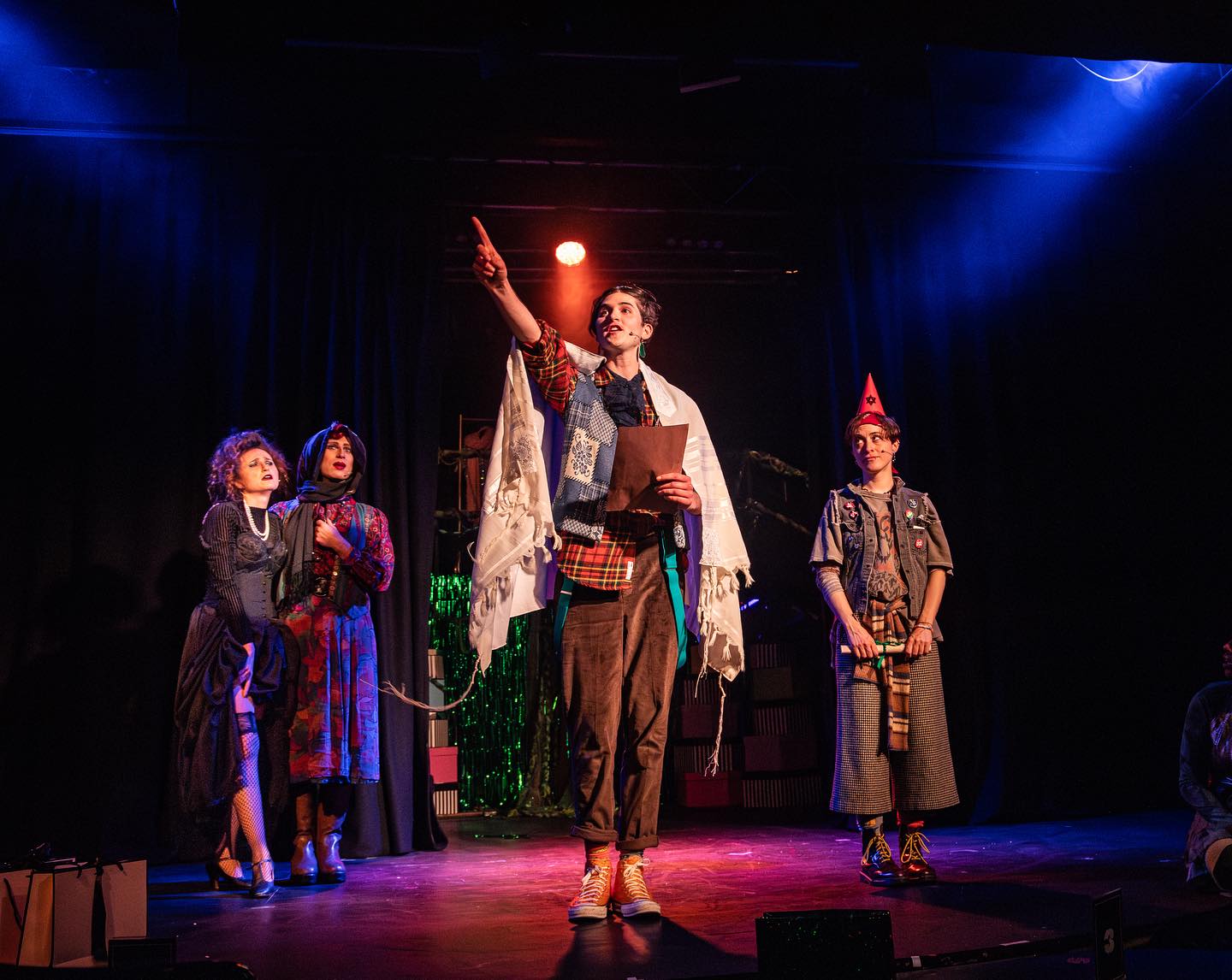
This March, Yankl and the Beanstalk hit the Pleasance Theatre on the Caledonian Road for a 4-night sprint. Written by Tamara Micner and directed by Laura Wohlwend, the show promised “A saucy, Queer, Jewish panto that will leave you gagging... for pickles, of course!”.
There’s plenty to be excited about in a pitch like this. Whilst undeniably ambitious, this combination of genres and cultures makes a lot of sense: queerness is baked into pantomime, as is the inclusion of topical socio-political references. There is also something profoundly moving about theatre that actively and vocally celebrates the interlacing of Jewishness, queerness, socialism and Britishness in a political landscape that often seeks to pit these ideas and experiences against one another, as though they cannot and do not coexist. Yankl exists in the connectedness, rather than the conflict, of identities. Yet sitting and watching Yankl, I felt surrounded by a sense of discomfort.
Admittedly, some of this was circumstantial – the show attracted many older theatregoers who may not have known what they were in for, resulting in some public dissent from a few elderly viewers who complained and walked out mid-show. But more than that, the production’s haphazard approach to pantomime created a disconnect between what the show seemed to be aiming for and what its viewers experienced.
Last year, JW3 put on Nick Cassenbaum’s Goldie Frocks and the Bear Mitzvah, which made a very conscious effort to unite stock Britishness and distinctive Jewishness for a young audience. This was truly a pantomime – cheesy, full of recently released music and recognisable classics, overflowing with puns, and fundamentally silly. Running from early December to early January, Goldie Frocks made contextual sense. You could see Julian Clary in Robin Hood, Alexandra Burke in Jack and the Beanstalk, or, for those seeking a more kosher experience, you could rock up at JW3 on Christmas Day for some culturally-specific entertainment. Within this framing, Goldie Frocks filled a gap, as it gave Jewish kids an opportunity to see themselves, their traditions, and their heritage in the characteristic seasonal style. Although slapstick and drag need by no means be restricted to Christmas, it struck me as odd to be seeing a pantomime in March. But the temporal randomness of this production put the choice of genre under the microscope, and it never managed to answer why this form was best suited to this content.
Perhaps more significantly, the transformation of what is typically U-rated into something more X-rated threw up a few challenges. Of course, no Dick Whittington at the Hackney Empire would be complete without some adult lines designed to soar over the little ones’ heads and hit the parents between the eyes. As a show for adults, Yankl dispensed with the classic panto approach of camouflaging raunchy jokes. There were moments when this really worked: “50 Shades of Vey” is the apex of saucy Jewish panto. But by removing the need to hide the jokes, there was nothing to stop the script from becoming oversaturated, and with no limitations, the result was something of a bombardment.
That said, the show was absolutely outstanding in its adherence to one particular panto staple – the Dame. Guy Woolf’s performance as Reyzl was fabulous. With poise and a wonderful command of the stage, Woolf grounded the whole show with all of the wink-wink-nudge-nudge charisma of the best pantomime dames and then some.
And it was Woolf with whom the songs, translated into Yiddish, had the greatest success. Some felt a little hard to follow, with out-of-time backing tracks or incomprehensible tunes, but Woolf’s Meydlekh viln nor hanoye hubn (Girls Just Wanna Have Fun) was genuinely funny. Demii Lee Walker’s choreography and the crispness of Woolf’s delivery (particularly on “der telefon klingt”, which I will be quoting for the foreseeable future) made this track instantly recognisable.
In Yankl, there were some seeds of an exciting production. There were moments of comedy, of sharp writing, of excellent performances. Woolf brought buckets of charm and presence, elevating the whole show and highlighting the potential of the script to shine. But this production was ambitious, arguably to its detriment. Perhaps these pickles could have fermented a little longer before hitting the shelves.
Hannah Davis (she/her) is a third-year Spanish student at Oxford University.
Author
Hannah Davis is (she/her) is a third-year Spanish student at Oxford University.
Sign up for The Pickle and New, From Vashti.
Stay up to date with Vashti.



